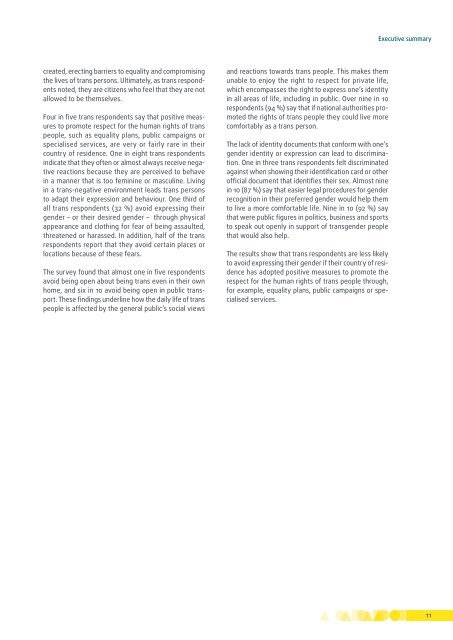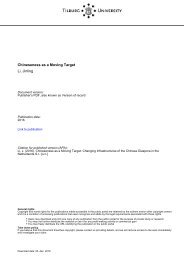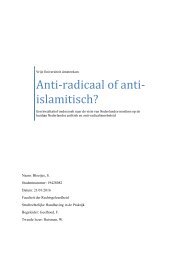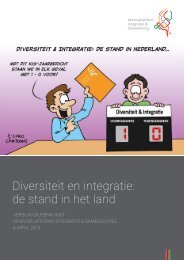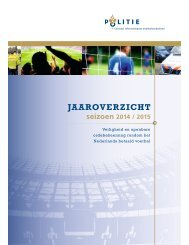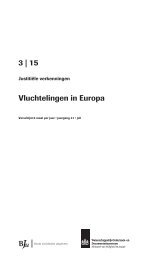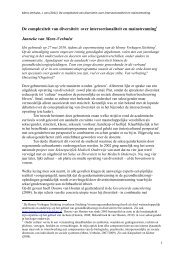Being Trans in the EU – Comparative analysis of EU LGBT survey datarespond<strong>en</strong>ts report this type of discrimination twice asoft<strong>en</strong> as lesbian, gay, and bisexual respond<strong>en</strong>ts.Turning to the reporting of incid<strong>en</strong>ts of discriminationto the police or elsewhere, only very small numbers ofrespond<strong>en</strong>ts reported the most rec<strong>en</strong>t incid<strong>en</strong>t. Transpeople are, nevertheless, more likely to report their lastexperi<strong>en</strong>ce of discrimination than other LGB groups.Comparing the differ<strong>en</strong>t <strong>trans</strong> subgroups, <strong>trans</strong> wom<strong>en</strong>are the most likely to report incid<strong>en</strong>ts, and g<strong>en</strong>der variantand female cross dressers the least likely. Reportingtook place significantly more oft<strong>en</strong>, however, wh<strong>en</strong>the last incid<strong>en</strong>t happ<strong>en</strong>ed at work (29 %). More thanthree in five <strong>trans</strong> respond<strong>en</strong>ts did not report the incid<strong>en</strong>tbecause they were convinced that nothing wouldhapp<strong>en</strong> or change, and half of them because theythought it was not worth reporting it. Trans respond<strong>en</strong>tswere also concerned that the incid<strong>en</strong>t would notbe tak<strong>en</strong> seriously, and they did not want to reveal theirsexual ori<strong>en</strong>tation and/or g<strong>en</strong>der id<strong>en</strong>tity. Almost onein three (30 %) did not know how or where to report.Viol<strong>en</strong>ceThe EU LGBT survey’s most striking result is the highlevel of repetitive viol<strong>en</strong>ce and hate-motivated crime<strong>trans</strong> persons suffer, 2 indicating the need to improvepolicies combating hate crime across the EU.The results show that the annual incid<strong>en</strong>ce rate of viol<strong>en</strong>ceor harassm<strong>en</strong>t is around one incid<strong>en</strong>t per two <strong>trans</strong>respond<strong>en</strong>ts, which is twice as high as the incid<strong>en</strong>cerates for lesbian, gay and bisexual respond<strong>en</strong>ts. Thismeans that one in two <strong>trans</strong> persons indicate that theywere attacked or targeted through viol<strong>en</strong>ce, threatsor insults in the year preceding the survey. About twoin five (44 %) <strong>trans</strong> respond<strong>en</strong>ts who were victims ofviol<strong>en</strong>ce in the 12 months preceding the survey indicatethat this happ<strong>en</strong>ed three or more times duringthis period. A breakdown by id<strong>en</strong>tity group shows thatfemale and male cross dressers are most likely to havesuffered multiple viol<strong>en</strong>t incid<strong>en</strong>ts (three times or more)in this period.With regard to viol<strong>en</strong>ce suffered for any reason andnot only due to the respond<strong>en</strong>ts’ g<strong>en</strong>der id<strong>en</strong>tity, <strong>trans</strong>respond<strong>en</strong>ts are the most likely of all LGBT groups to saythey were attacked or threat<strong>en</strong>ed with viol<strong>en</strong>ce in boththe five-year and one-year time periods asked aboutin the survey. In the five years preceding the survey,34 % of all <strong>trans</strong> respond<strong>en</strong>ts experi<strong>en</strong>ced viol<strong>en</strong>ce orwere threat<strong>en</strong>ed with viol<strong>en</strong>ce, and 15 % experi<strong>en</strong>cedviol<strong>en</strong>ce or the threat of viol<strong>en</strong>ce in the 12 months precedingthe survey. These viol<strong>en</strong>t incid<strong>en</strong>ts may havetak<strong>en</strong> place for any reason, not only due to respond<strong>en</strong>t’s2 FRA (2012).g<strong>en</strong>der id<strong>en</strong>tity. A breakdown by id<strong>en</strong>tity group showshigh numbers of viol<strong>en</strong>t incid<strong>en</strong>ts in the 12 months precedingthe survey, ranging from 40 % for queer/otherrespond<strong>en</strong>ts up to 50 % for male cross dressers.About one in 10 (8 %) <strong>trans</strong> respond<strong>en</strong>ts were physicallyor sexually attacked or threat<strong>en</strong>ed with viol<strong>en</strong>ce whichthey think happ<strong>en</strong>ed partly or <strong>en</strong>tirely because theywere perceived to be <strong>trans</strong>. In the 12 months precedingthe survey, hate-motivated viol<strong>en</strong>ce was mostly likelyamong <strong>trans</strong> wom<strong>en</strong> (16 %), male cross dressers (14 %)and <strong>trans</strong>g<strong>en</strong>der respond<strong>en</strong>ts (11 %). Among all theLGBT survey respond<strong>en</strong>ts the <strong>trans</strong> respond<strong>en</strong>ts arethe most likely to report to the police hate-motivatedviol<strong>en</strong>ce. One out of five reported the most rec<strong>en</strong>t hatemotivatedincid<strong>en</strong>t (21 %) and one in four the mostserious one (24 %) to the police.A breakdown by id<strong>en</strong>tity groups shows that <strong>trans</strong> m<strong>en</strong>are the least likely to report incid<strong>en</strong>ts of viol<strong>en</strong>ce to thepolice for both the last and the most serious incid<strong>en</strong>t.Female cross dressers are the most likely to report thelast hate-motivated incid<strong>en</strong>t of viol<strong>en</strong>ce of the previousyear (37 %). Trans wom<strong>en</strong> are the most likely to reportthe most serious incid<strong>en</strong>t of viol<strong>en</strong>ce of the previousfive years (32 %).Perpetrators of viol<strong>en</strong>ce and harassm<strong>en</strong>t are in mostcases unknown males acting in groups. The hate-motivatedincid<strong>en</strong>ts take place almost as oft<strong>en</strong> indoors asoutdoors, while hate-motivated harassm<strong>en</strong>t occursslightly more oft<strong>en</strong> in indoor public spaces. Of all outdoorlocations, <strong>trans</strong> respond<strong>en</strong>ts most oft<strong>en</strong> m<strong>en</strong>tionincid<strong>en</strong>ts in a street, square, car park or other publicplace. Of all indoor locations, hate-motivated viol<strong>en</strong>cehapp<strong>en</strong>ed most oft<strong>en</strong> at home, whereas hate-motivatedharassm<strong>en</strong>t happ<strong>en</strong>ed most oft<strong>en</strong> at the workplace.One in 10 of the most rec<strong>en</strong>t incid<strong>en</strong>ts of harassm<strong>en</strong>ttook place on the internet or by email, including Facebookand Twitter.Living as a <strong>trans</strong> personThe survey data show that many <strong>trans</strong> people grow upand live in a social <strong>en</strong>vironm<strong>en</strong>t which is mostly unawareof <strong>trans</strong> people’s exist<strong>en</strong>ce and needs. Wh<strong>en</strong> thefear, caused by persist<strong>en</strong>t victimisation and discrimination,collides with the ignorance of others – includingone’s own family, work or social <strong>en</strong>vironm<strong>en</strong>t – hidingor avoiding visibility serves as a def<strong>en</strong>sive measure. Butthis choice inevitably reinforces a lack of recognitionand acknowledgem<strong>en</strong>t of <strong>trans</strong> persons’ rights. Stereotypesand ignorance about the reality of the daily livesand rights of <strong>trans</strong> persons perpetuate negative publicattitudes and maltreatm<strong>en</strong>t of varying int<strong>en</strong>sity; fromidiotic jokes and off<strong>en</strong>sive language to serious harassm<strong>en</strong>tand exclusion. In this way, an invisible cage is10
Executive summarycreated, erecting barriers to equality and compromisingthe lives of <strong>trans</strong> persons. Ultimately, as <strong>trans</strong> respond<strong>en</strong>tsnoted, they are citiz<strong>en</strong>s who feel that they are notallowed to be themselves.Four in five <strong>trans</strong> respond<strong>en</strong>ts say that positive measuresto promote respect for the human rights of <strong>trans</strong>people, such as equality plans, public campaigns orspecialised services, are very or fairly rare in theircountry of resid<strong>en</strong>ce. One in eight <strong>trans</strong> respond<strong>en</strong>tsindicate that they oft<strong>en</strong> or almost always receive negativereactions because they are perceived to behavein a manner that is too feminine or masculine. Livingin a <strong>trans</strong>-negative <strong>en</strong>vironm<strong>en</strong>t leads <strong>trans</strong> personsto adapt their expression and behaviour. One third ofall <strong>trans</strong> respond<strong>en</strong>ts (32 %) avoid expressing theirg<strong>en</strong>der – or their desired g<strong>en</strong>der – through physicalappearance and clothing for fear of <strong>being</strong> assaulted,threat<strong>en</strong>ed or harassed. In addition, half of the <strong>trans</strong>respond<strong>en</strong>ts report that they avoid certain places orlocations because of these fears.The survey found that almost one in five respond<strong>en</strong>tsavoid <strong>being</strong> op<strong>en</strong> about <strong>being</strong> <strong>trans</strong> ev<strong>en</strong> in their ownhome, and six in 10 avoid <strong>being</strong> op<strong>en</strong> in public <strong>trans</strong>port.These findings underline how the daily life of <strong>trans</strong>people is affected by the g<strong>en</strong>eral public’s social viewsand reactions towards <strong>trans</strong> people. This makes themunable to <strong>en</strong>joy the right to respect for private life,which <strong>en</strong>compasses the right to express one’s id<strong>en</strong>tityin all areas of life, including in public. Over nine in 10respond<strong>en</strong>ts (94 %) say that if national authorities promotedthe rights of <strong>trans</strong> people they could live morecomfortably as a <strong>trans</strong> person.The lack of id<strong>en</strong>tity docum<strong>en</strong>ts that conform with one’sg<strong>en</strong>der id<strong>en</strong>tity or expression can lead to discrimination.One in three <strong>trans</strong> respond<strong>en</strong>ts felt discriminatedagainst wh<strong>en</strong> showing their id<strong>en</strong>tification card or otherofficial docum<strong>en</strong>t that id<strong>en</strong>tifies their sex. Almost ninein 10 (87 %) say that easier legal procedures for g<strong>en</strong>derrecognition in their preferred g<strong>en</strong>der would help themto live a more comfortable life. Nine in 10 (92 %) saythat were public figures in politics, business and sportsto speak out op<strong>en</strong>ly in support of <strong>trans</strong>g<strong>en</strong>der peoplethat would also help.The results show that <strong>trans</strong> respond<strong>en</strong>ts are less likelyto avoid expressing their g<strong>en</strong>der if their country of resid<strong>en</strong>cehas adopted positive measures to promote therespect for the human rights of <strong>trans</strong> people through,for example, equality plans, public campaigns or specialisedservices.11


